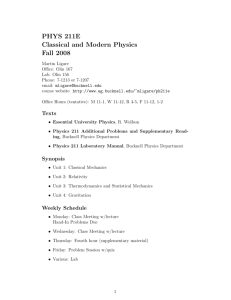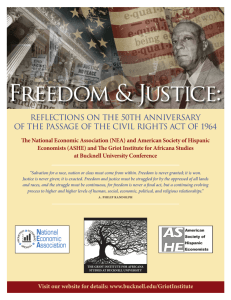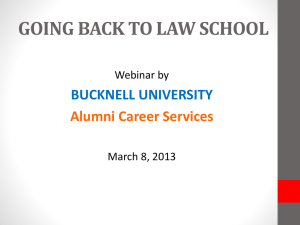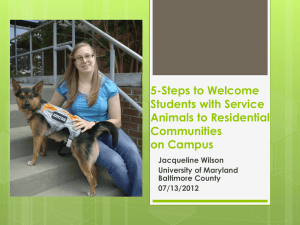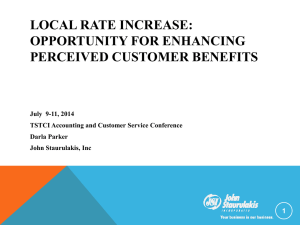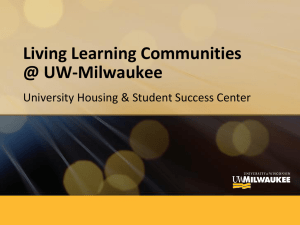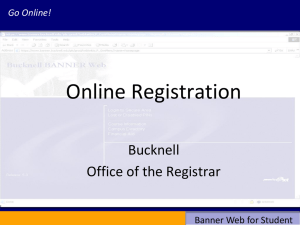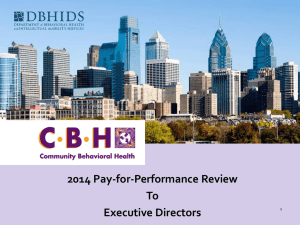Residential Colleges: Bucknell`s Living/ Learning Communities
advertisement
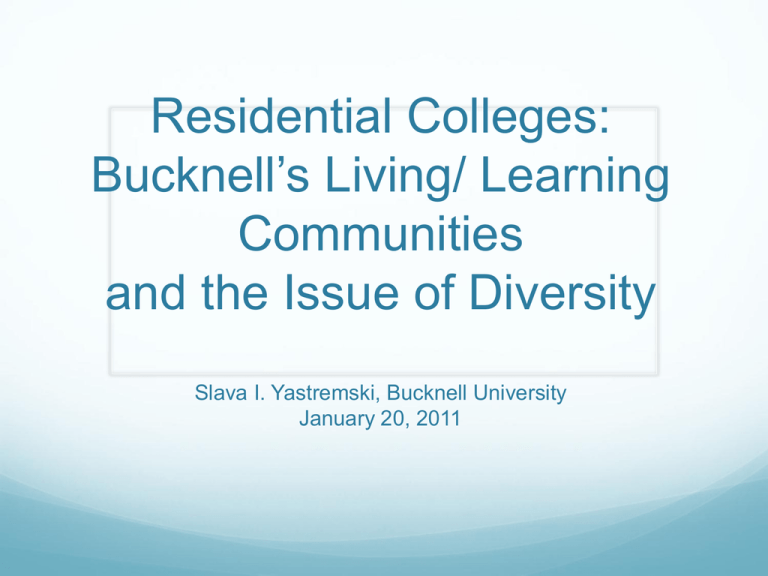
Residential Colleges: Bucknell’s Living/ Learning Communities and the Issue of Diversity Slava I. Yastremski, Bucknell University January 20, 2011 Residential Colleges Mission Statement Bucknell University’s Residential College program promotes a distinctive living-learning environment dedicated to enriching first-year student learning. By bridging curricular, co-curricular and residential experiences, the Program enhances and combines students’ academic engagement and social interaction during their first year at Bucknell and beyond. Approved by the Residential College Advisory Board September 29, 2010 Vision Gradual expansion of student enrollment in the Living/ Learning Communities for Fall 2012 Expansion of curricular offerings across the university Development of curricular and extracurricular opportunities for student involvement in the Living/Learning Communities throughout their Bucknell career Living/Learning Communities fully integrated into the Plan for Bucknell Living/Learning Communities fully integrated into the new Arts and Sciences Core Curriculum What have the Residential CollegesLiving/Learning Communities been? Living/Learning communities Students in RC FNs live together (current enrollment 225 approx.) Common hours—1 ½ hours a week Extra- and co-curricular programming through RC office—Kelly Finley and Courtney Firman Field trips Overnight trips to NYC. DC, Philadelphia JFs and RFs are alumni of the RC Upper class housing Summary of NSSE Results LLC Participants Are Different Coming Into Bucknell Program is providing a valuable service to students with more investment in their academic careers Program is serving many of the institutions goals regarding many types of diversity Program could be marketed as one of key to change type of student attracted overall LLC Has an Independent, Positive Effect on Engagement Beyond the “Self-Selection” Issue Program effects are manifested in a myriad of measures Program effects remain positive, significant both statistically and in relative importance even after controlling for Other student characteristics (major, gender, Greek affiliation etc..) Incoming engagement/achievement measures *From report by Prof. Amy Wolver, economics Faculty voices: “I think it is an excellent program, and I really enjoyed the student-teacher interaction that the residential college engenders. I also appreciate its emphasis on integrating various kinds of learning and experience into one course.” - From 2009 survey of Faculty perceptions of Res. college The program attracts students from both Arts & Sciences and Engineering This year we enrolled: 164 Arts & Sciences students 61 Engineering students Seven Residential Colleges Arts College The Arts College affirms a vital connection between life and art. We study living artists as well as those who have come before us. We believe that by making art we cross the boundary between sense and mystery, the individual and the other. Seven Residential Colleges Environmental College Studies the interaction of human communities and the environment in a spectrum of issues - from the scientific to the cultural – engaged by scholars and “green sector” professionals. Global College Seeks to educate students about the evolution of the modern world system and about contemporary global issues. Languages and Cultures College Introduces students to the cultures of non-English speaking countries and also to the phenomenon of cross-cultural communication. Through discussion of topics such as daily life, the arts, society, politics, religion, pop culture and commerce, you will develop a greater appreciation for the differences and commonalities that make up our world. Seven Residential Colleges Humanities College Provides a hospitable and nurturing environment to students interested in literary and philosophical questions and who are looking for a place to meet like-minded people. Students study and discuss classical epic, tragedy, and philosophy. They also study the Hebrew and Christian scriptures, and the transformation of the classical world to the Christian West. Seven Residential Colleges Social Justice College Focuses on selected historic and contemporary themes of social justice in the United States. Students are challenged to take the perspective of those who are marginalized in our society and to critically and compassionately examine issues of social justice from today’s headlines. Recent courses studied poverty, inequality in education and health care, immigration, and gay and lesbian civil rights. Society and Technology College What is the future of the planet and what role will technology play in creating that future? In SocTech, we focus on a few key future technologies that present both challenges and opportunities: genetic engineering, food production, and the internet. We ask the following questions: how and why are these technologies chosen? Do we act—indeed, can we act— ethically and rationally as individuals to control our destinies when technological change seems to threaten other human values? In a modern technological world, how much can we control our fates, either as individuals or as a society? Student Voices: “Academically it helped me greatly because I spent more time with my advisor than I would otherwise so I felt more comfortable with the faculty. Socially, it was easier to make friends because of the shared interests. Personally, it was a crux that I needed for the transition. I had a niche.” -From 2009 student survey Faculty voices: “I did not realize how teaching with faculty members [from different departments] would broaden my perspective on both my teaching pedagogy and my own discipline. It was a significant professional growth experience.” - From 2009 survey of Faculty perceptions of Res. college Student Voices: I really liked the sort of person that my Residential College attracted and found myself engaging in deeper conversation with my hall-mates.” -From 2009 student survey Student voices: “… even though you all share a passion for a particular res college, everyone also has a lot of other interests and perspectives, so there is also a lot of diversity.” - From 2009 student survey Enriching Educational Experiences Following data shows before college experiences with diversity compared to after first year at Bucknell Compares LLC participants and non-participants This and the following data comes from Prof Amy Wollaver’s studies of the student engagement at Bucknell, 2009-10 % Reporting “Had Serious Conversation with someone from a different race/ethnicity” often/very often 52.6 60 50 59.9 48 42.4 40 30 20 LLC and Non-participants statistically significantly different after first year at BU Are not different as incoming first year students. The change in frequency before and after the first year is statistically significant for only LLC participants. 10 0 LLC participants High School End of First Year at Bucknell Source: Author’s analysis of 2007 BCSSE & 2008 NSSE. Non Participants % Reporting Had Serious Conversation with someone of a different background” often/very often 66.9 70 59.1 60 51.1 55.4 50 40 30 20 10 All changes/differences statistically significant. Overall frequency increases after first year at Bucknell LLC participants have more frequent conversations on average relative to nonparticipants both As incoming students & At end of first year at BU LLC participants 0 High School End of First Year at Bucknell Source: Author’s analysis of 2007 BCSSE & 2008 NSSE. Non-participants Summary Living Learning Community at Bucknell is serving an important role at enhancing & maintaining diversity along a number of measures Race and Ethnicity International Students First Generation College Students Different views/beliefs Furthermore, students in this living and learning community are more likely to report achieving educational goals associated with having a diverse student body Living Learning Community (LLC) Pedagogy Effects on First Year Students 70 % Often/Very Often Non-Participants 60 50 37.6 40 30 26.4 35 24.5 20 10 0 1 2 LLC participants Residential College Students 1 Talked about career plans with 61.1 faculty 53.5 2 Discussed ideas from class with faculty 3 Worked with faculty members 30.1 on activities other than coursework 17.3 (from faculty committees, etc.) 4 Received Frequent Feedback from faculty 3 4 Source: Calculations from Bucknell University Sample, 2008 National Survey on Student Engagement All differences are statistically signficantly different from zero. LLC Pedagogy Effects, Full Sample (Seniors & First Years Combined) Non-Participants 87.2 81.8 Fraction of Subsample responding Often/Very Often 90 80 70 76.1 70.5 60 70.5 64.9 69 66.5 58.5 53.2 62.5 56 50 40 30 20 10 0 1 2 3 4 1 Ask Questions in Class 2 Made Class Presentations 3 Paper integrated various Sources 65.6 4 Used Diverse Perspectives for Class 55.7 5 Use Electronic Medium to do an assignment 6 Learned something that changed the way you understand an issue or concept 7 Discussed ideas from your readings or classes with others outside of class Residential College Students LLC Participants 5 6 Source: Author’s analysis of 2008 NSSE. All displayed differneces statstically significant, 5% level 7 Summary of Results LLC Participants Are Different Coming Into Bucknell Program is providing a valuable service to students with more investment in their academic careers Program is serving many of the institutions goals regarding many types of diversity Program could be marketed as one of key to change type of student attracted overall LLC Has an Independent, Positive Effect on Engagement Beyond the “Self-Selection” Issue Program effects are manifested in a myriad of measures Program effects remain positive, significant both statistically and in relative importance even after controlling for Other student characteristics (major, gender, Greek affiliation etc..) Incoming engagement/achievement measures Issues in the External Review 2010 Program is already successful Increased student engagement More diverse student population Improved learning and teaching climate Suggested changes need to be carefully implemented Structure of program Name of program Application method for students more thematic flexibility Institutional support and visibility Living/Learning Communities and Diversity at Bucknell--the Look Ahead Living/Learning Communities offer an engaging and safe environment for students from racially, socially, and economically diverse background which allows them an easier assimilation in the academic and residential life at Bucknell. Initiatives for furthering the diversity issues: Fiver/Bucknell program the program not only introduces ‘firstgeneration college students and students from the underprivileged economic background to the college level courses but also exposes their Bucknell peers to the diverse, multicultural environment of the inner city life.
